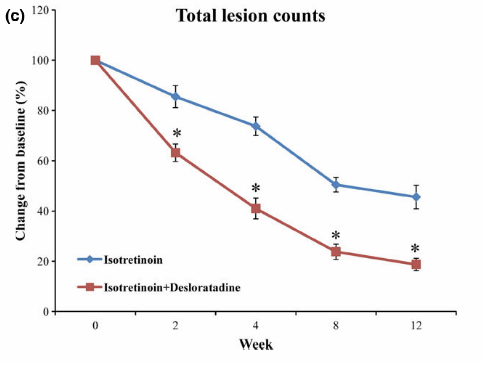Histamine has been linked to various skin problems.
In a study published in 2014, Korean researchers tested antihistamines as an adjuvant treatment of isotretinoin. They took 40 people with moderate acne and divided them into two groups. One group got isotretinoin (Accutane) while the other group got isotretinoin and an antihistamine. This graph shows the number of pimples over time in both groups.

Lee, H. E. et al. Effect of antihistamine as an adjuvant treatment of isotretinoin in acne: a randomized, controlled comparative study. J Eur Acad Dermatol Venereol 28, 1654–60 (2014). https://www.ncbi.nlm.nih.gov/pubmed/25081735
At the end of the study, the group that also got antihistamines had roughly half the number of pimples than the group that only got isotretinoin.
Itching in acne
Itching is usually a sign of histamine issues. While nobody has looked at the relationship between histamine and acne, several studies have shown itching is surprisingly common among acne patients. A study from 2008 asked a group of 108 Polish teenagers with acne how often their skin itched.
- 7.4% reported itching every day
- 24.1% reported itching at least once a week
- 29.6% said at least once a month
- 37.7% said less frequently
In over half the cases, itching lasted less than a minute.
On the other hand, 31.5% said itching bothered them enough to seek medical treatment. And about 10% of acne patients experience severe itching that interferes with sleep and daily life.
Another study from 2008 surveyed 120 acne patients at a clinic in Singapore and found that 70% complained of itching in acne lesions. In this study, the severity of itching was comparable to that of a mosquito bite. 37% reported itching every day and 25% on a weekly basis.
Sweating, stress, physical exercise, heat, fatigue, and dry air can make itching worse. The fact that Singapore is much hotter than Poland could explain why the patients in the second study experienced more itching.
P. Acnes bacteria (the one associated with acne) has been shown to produce histamine, which could explain why itching is so common among acne patients.
Other skin problems
In a 2006 study, researchers compared 162 patients with eczema and 124 people with histamine intolerance to 85 healthy controls. Their results showed that symptoms of histamine intolerance were far more common among the eczema patients than healthy controls – though not quite as common as in the histamine intolerant group. Histamine levels were increased in both eczema and histamine intolerant groups.
The researchers followed this up by putting 17 people with eczema and low DAO activity on a low histamine diet along oral antihistamines. After two weeks, the symptoms of histamine intolerance either completely went away or were reduced by over 50% in 95% of the patients. Eczema severity dropped by around 50%.
This study shows that histamine intolerance plays a part in a portion of eczema patients.
A French study from 1987 showed that three-month treatment with antihistamine drugs cimetidine reduced sebum production and oiliness of the skin – without any effect on androgen levels. However, I don’t recommend you try cimetidine. It inhibits stomach acid production, which is almost guaranteed to cause small intestine bacterial overgrowth and other gut problems.
Other studies have shown histamine plays a role also in other skin conditions.
